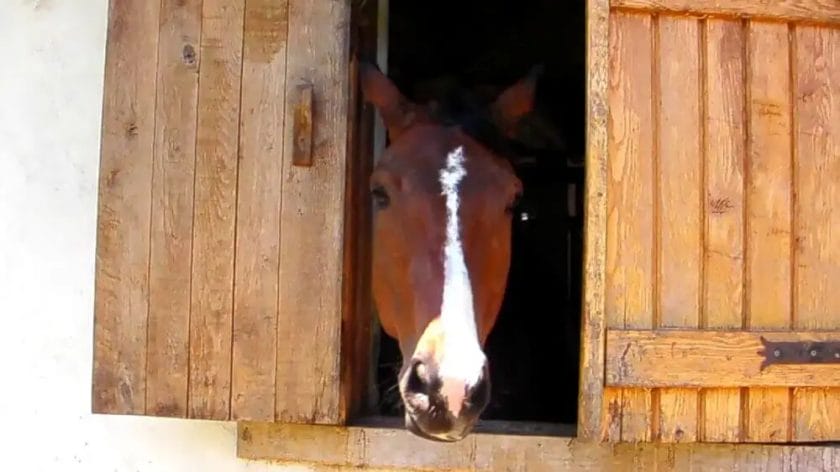Horses sticking their tongues out may seem odd, but it’s actually a natural behavior with various explanations. One reason is to release excess heat, as horses primarily cool down through their mouths. Additionally, sticking out their tongue can be a sign of relaxation or contentment. Sometimes, it’s a response to discomfort or irritation, such as a way to cope with a bit that doesn’t fit properly. Understanding why horses stick their tongues out can help horse owners better interpret their behavior and ensure their well-being.

Tongue Out: A Possible Indicator of Equine Health and Well-being
When it comes to the health and well-being of horses, there are various signs and symptoms that owners and caretakers need to be aware of. One such indicator that often goes unnoticed is when a horse sticks its tongue out. While this behavior may seem unusual or even comical at times, it can actually provide valuable insights into the horse’s overall health and well-being.
So, why does a horse stick its tongue out? There are several reasons that can contribute to this behavior. One possible cause is dental issues. Horses with dental problems, such as sharp or uneven teeth, may find it difficult to keep their tongues properly positioned in their mouths. As a result, the tongue may protrude or hang out.
Another factor that can lead to tongue protrusion is discomfort or pain. Horses that are experiencing mouth ulcers, sores, or other oral conditions may try to relieve the discomfort by extending their tongues. This behavior allows them to alleviate pressure or irritation on sensitive areas of their mouths.
In some cases, a horse may stick its tongue out as a response to stress or anxiety. Just like humans, horses can exhibit various behaviors when they are feeling uneasy, and protruding the tongue can be one way for them to cope with their emotions. It’s important for horse owners to understand the underlying reasons for their horse’s stress and address them accordingly.
Furthermore, certain medical conditions can also contribute to tongue protrusion in horses. For example, neurological disorders or injuries may affect the horse’s ability to control the muscles in its mouth, leading to the tongue hanging out. Additionally, tongue out behavior can be a symptom of respiratory issues, such as airway obstructions or allergies, which can make breathing difficult for the horse.
Recognizing when a horse is sticking its tongue out is the first step in understanding its potential health implications. However, it is crucial to evaluate the behavior in conjunction with other signs and symptoms to determine the underlying cause. Observing the horse’s overall demeanor, appetite, weight, and performance can provide valuable clues.
If a horse consistently displays tongue out behavior or if it is accompanied by other concerning symptoms, it is recommended to consult a veterinarian. A thorough examination and diagnostic tests can help identify any underlying dental, medical, or psychological issues that may be contributing to the behavior.
In summary, a horse sticking its tongue out should not be dismissed as mere quirkiness. Instead, it should be seen as a potential indicator of the horse’s health and well-being. Whether it is due to dental problems, discomfort, stress, or underlying medical conditions, understanding the reasons behind this behavior can help horse owners take appropriate measures to ensure their horse’s optimal health and happiness.

Training Techniques: Addressing Tongue Sticking Behavior in Horses
One common behavior that some horses exhibit is tongue sticking, where the horse sticks its tongue out of its mouth during riding or handling. This behavior can be both distracting and potentially dangerous. It is important to address and correct this behavior to ensure the safety and well-being of both the horse and the rider. In this section, we will discuss various training techniques that can be used to address tongue sticking behavior in horses.
1. Identifying the Cause
The first step in addressing tongue sticking behavior is to identify the underlying cause. Tongue sticking can be a sign of discomfort, anxiety, or even a learned behavior. It is essential to observe the horse closely to determine when and why the behavior occurs. Possible causes may include improper bit fit, dental issues, or inadequate training. Once the cause is identified, appropriate training techniques can be implemented to address the behavior.
2. Bit Adjustment
One common cause of tongue sticking is an ill-fitting bit. A bit that is too large or too small can cause discomfort and encourage the horse to stick its tongue out. Ensuring that the bit is properly fitted is crucial. If necessary, consult with a professional trainer or equine dentist to determine the correct bit size and type for your horse. A well-fitted bit will help minimize discomfort and reduce the likelihood of tongue sticking behavior.
3. Desensitization and Counterconditioning
Desensitization and counterconditioning techniques can be effective in addressing tongue sticking behavior. Gradual exposure to the triggers that elicit the behavior can help the horse become more comfortable and less prone to sticking its tongue out. For example, if the horse sticks its tongue out when wearing a bridle, start by introducing the bridle in short sessions, gradually increasing the duration over time. Pairing the introduction of the bridle with positive reinforcement, such as treats or praise, can help create a positive association and reduce the likelihood of tongue sticking.
4. Reinforcement of Correct Behavior
When addressing tongue sticking behavior, it is essential to reinforce correct behavior. Reward the horse for keeping its tongue inside its mouth during riding or handling. Use positive reinforcement techniques, such as praise, treats, or a release of pressure, to reward the horse when it exhibits the desired behavior. Consistency and patience are key in reinforcing correct behavior and gradually eliminating tongue sticking.
5. Professional Assistance
In some cases, seeking the assistance of a professional horse trainer may be necessary. A professional can provide specialized training techniques and guidance tailored to address the specific tongue sticking behavior. They can assess the horse’s behavior, identify any underlying issues, and develop a comprehensive training plan to correct the behavior effectively.
6. Regular Dental Check-ups
Dental issues can contribute to tongue sticking behavior in horses. Regular dental check-ups by a qualified equine dentist are crucial to ensure that the horse’s teeth and mouth are healthy. Dental problems, such as sharp points or painful ulcers, can cause discomfort and lead to tongue sticking. Addressing any dental issues promptly can help alleviate the behavior.
In summary, tongue sticking behavior in horses can be addressed through various training techniques. Identifying the underlying cause, ensuring proper bit fit, desensitization and counterconditioning, reinforcement of correct behavior, seeking professional assistance when necessary, and regular dental check-ups are all essential steps in correcting this behavior. With patience, consistency, and appropriate training, tongue sticking behavior can be effectively addressed, enhancing the safety and overall well-being of the horse and its rider.

Dental Health and Tongue Sticking: Exploring the Connection
When it comes to oral health, most of us are aware of the importance of brushing our teeth, flossing regularly, and visiting the dentist for check-ups. However, there is another fascinating aspect of dental health that often goes unnoticed – the connection between dental health and tongue sticking. In this section, we will delve into this intriguing relationship and understand how the health of our teeth and gums can affect the behavior of our tongues.
The Tongue’s Role in Oral Health
The tongue is not just a muscle that helps us taste and swallow food; it also plays a crucial role in maintaining oral health. It constantly moves around the mouth, helping to cleanse the teeth and remove food particles that may be stuck between them. Furthermore, the tongue also aids in the production of saliva, which helps in the digestion process and keeps the mouth moist.
The Link Between Dental Health and Tongue Sticking
When there are underlying issues with dental health, such as tooth decay, gum disease, or poorly fitting dental restorations, it can lead to discomfort and pain. In response to this discomfort, the tongue may stick out or repeatedly rub against the affected area, providing temporary relief. This behavior is commonly seen in children who are teething or individuals with oral health problems.
A study conducted by researchers at a renowned dental institute found that individuals with dental issues, such as cavities or gum infections, were more likely to exhibit tongue sticking behavior compared to those with healthy teeth and gums. The researchers concluded that the tongue sticking response could be a subconscious attempt by the body to alleviate pain or discomfort caused by dental problems.
Impact on Oral Habits
Tongue sticking due to dental health issues can have a significant impact on oral habits. Individuals may find it challenging to eat certain foods, speak clearly, or maintain good oral hygiene practices. The constant presence of the tongue outside the mouth can increase the risk of bacteria buildup, leading to bad breath or other oral infections.
Addressing Dental Health Issues
If you notice persistent tongue sticking or any discomfort in your oral cavity, it is essential to seek professional dental care. Your dentist will perform a thorough examination to identify any underlying dental problems and recommend appropriate treatment. This may include dental fillings, root canal therapy, periodontal treatment, or the replacement of ill-fitting restorations.
In addition to professional dental care, maintaining good oral hygiene practices is crucial for overall dental health. Brush your teeth at least twice a day with fluoride toothpaste, floss daily, and rinse your mouth with antibacterial mouthwash. Regular dental check-ups and cleanings can help detect and address any potential issues before they escalate.
In summary, dental health and tongue sticking are intricately connected. The tongue’s behavior can be a response to underlying dental problems, and addressing these issues is crucial for maintaining good oral health. By prioritizing dental care and adopting good oral hygiene practices, we can ensure a healthy mouth, a confident smile, and a tongue that stays where it belongs – inside the mouth!
Common Misconceptions: Debunking Myths about Horses Sticking Their Tongues Out
There are many misconceptions surrounding horses and their behavior. One common myth is about horses sticking their tongues out. This behavior is often misunderstood and can lead to confusion among horse owners and enthusiasts. In this section, we will debunk some of the myths and provide a better understanding of why horses may stick their tongues out.
1. Horses Stick Their Tongues Out as a Sign of Stress or Anxiety
Contrary to popular belief, sticking their tongues out does not always indicate that a horse is stressed or anxious. While it’s true that some horses may exhibit this behavior when they are feeling uneasy, it is not the sole reason for tongue protrusion. Horses have different ways of expressing their emotions, and sticking their tongues out can be one of them.
2. Sticking the Tongue Out is a Health Issue
Another misconception is that horses stick their tongues out due to underlying health issues. While it is essential to monitor your horse’s overall health, tongue protrusion alone is not necessarily an indication of a medical problem. Horses may naturally stick their tongues out for various reasons, such as relaxation, curiosity, or even as a response to something they find interesting.
3. It is a Sign of Poor Training
Some people believe that horses sticking their tongues out are a result of poor training or handling. However, this is not always the case. While it is true that improper training techniques can lead to behavioral issues in horses, tongue protrusion is not solely linked to training methods. It is essential to consider the individual horse’s temperament, overall training program, and other factors before attributing this behavior to poor training.
4. Horses Stick Their Tongues Out When They’re Being Stubborn
It is a common myth that horses stick their tongues out as a sign of stubbornness. While horses can indeed display stubborn behavior at times, sticking their tongues out is not necessarily a direct indicator of this trait. Horses may stick their tongues out for various reasons, and it is crucial to consider the context and other behavioral cues before making assumptions about their intentions.
5. It is a Sign of Discomfort or Pain
Many people assume that horses sticking their tongues out are experiencing discomfort or pain. While it is essential to be vigilant and attentive to any signs of distress in our equine companions, tongue protrusion alone does not always indicate physical discomfort. Horses have different ways of communicating their pain or discomfort, and it is essential to assess their overall behavior and health before drawing conclusions.
In summary, horses sticking their tongues out is often misunderstood, leading to several common misconceptions. While it is essential to be observant and responsive to any changes in our horses’ behavior, it is equally crucial to avoid jumping to conclusions. Tongue protrusion can be a natural behavior for some horses and may not always indicate stress, health issues, training problems, stubbornness, or pain. Understanding and interpreting our horses’ behavior requires a comprehensive assessment of various factors and not solely relying on a single behavior.
FAQs
Why do horses stick their tongues out?
Horses may stick their tongues out due to various reasons like exploring their environment, alleviating discomfort or irritation, expressing relaxation or contentment, or as a learned behavior. It can also be a sign of dental issues or excessive salivation. If concerned, it’s best to consult a veterinarian.
Conclusion:
In conclusion, the act of horses sticking their tongues out is a behavior that can be attributed to various reasons. One possible explanation is that they are trying to alleviate discomfort or irritation in their mouths. Another reason could be that they are attempting to communicate with their handlers or other horses. Additionally, sticking out their tongues can be a sign of relaxation or contentment in certain situations. It is important to remember that not all horses exhibit this behavior, and individual preferences and circumstances may vary. Overall, understanding the reasons behind this behavior can help horse owners and handlers better cater to their needs and ensure their well-being.
